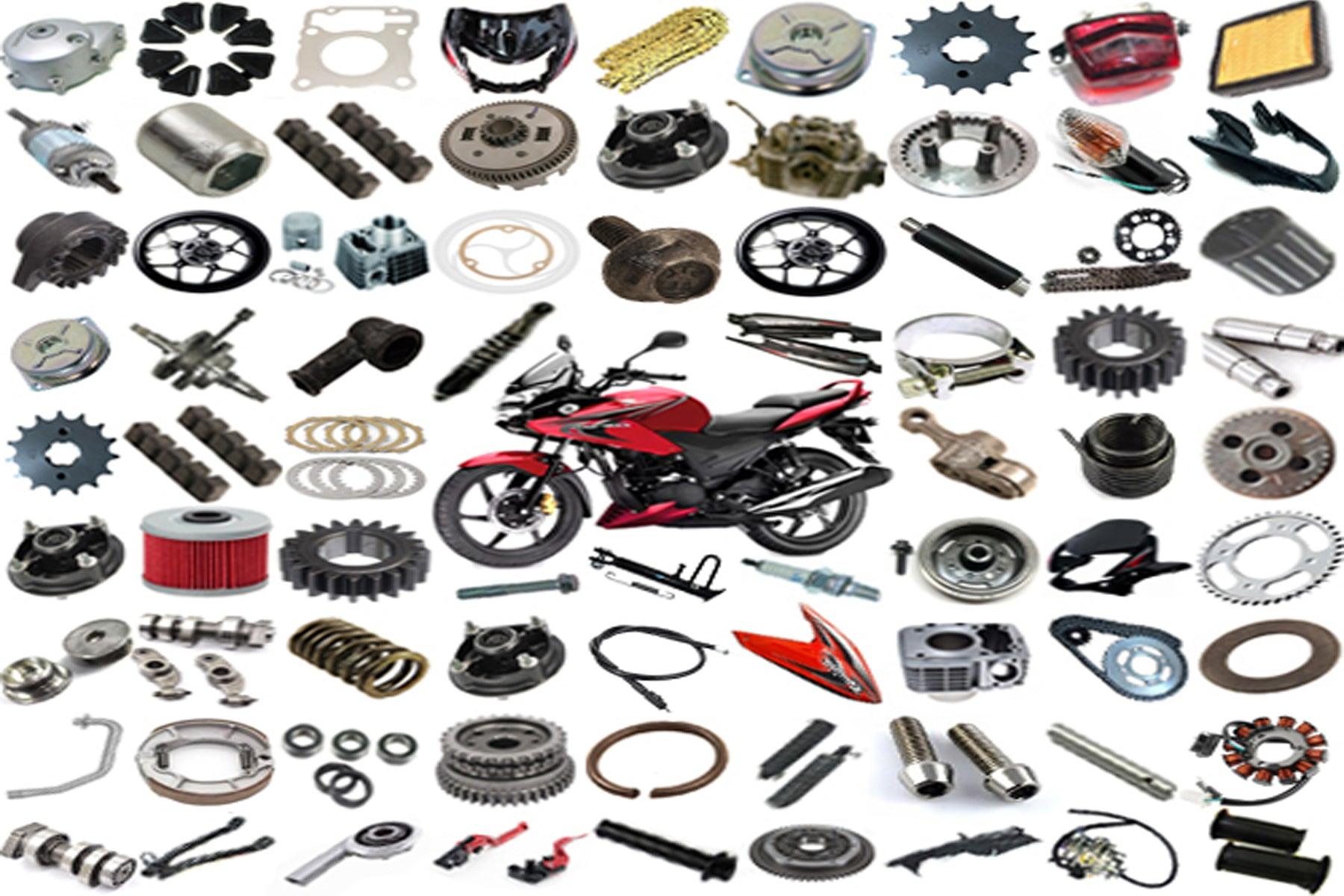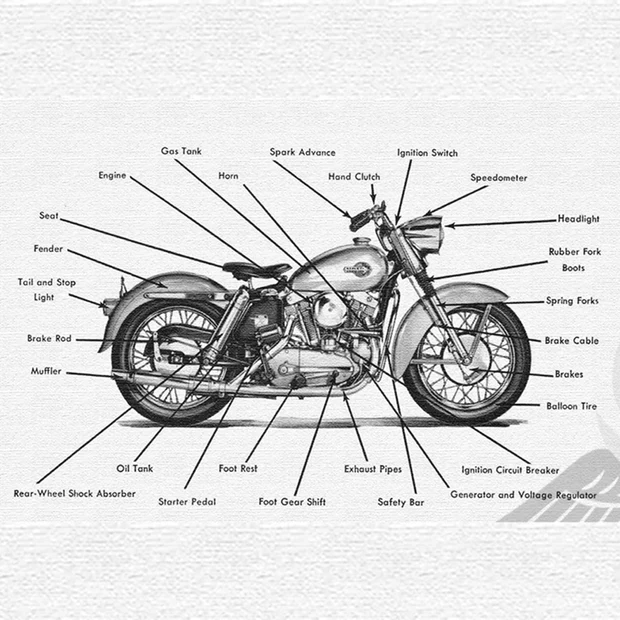Top 5 Motorcycle Parts Auckland for Riders in NZ
Discover the Vital Motorcycle Components You Need for Optimal Performance
Recognizing the necessary parts of a motorbike is basic for accomplishing peak efficiency. Each part, from the engine to the stopping system, plays a crucial function in total capability and safety. Routine upkeep can stop unanticipated failings and boost the riding experience. Numerous bikers ignore the complexities of these systems. Uncovering just how they function with each other can result in an extra effective adventure. What essential elements should every motorcyclist focus on?
The Engine: The Heart of Your Motorbike
The engine acts as the core element of a motorbike, driving its efficiency and specifying its capacities. It is liable for transforming gas into power, which powers the bike onward. Various types of engines are utilized, including single-cylinder, V-twin, and inline configurations, each offering distinctive qualities suited for various riding functions and styles. The engine dimension, commonly gauged in cubic centimeters (cc), substantially influences performance, with bigger engines normally supplying more power and torque.Furthermore, the engine's design and innovation, such as gas shot systems or air-cooling versus liquid-cooling, affect effectiveness and dependability. Maintenance is important for peak operation; aspects like routine oil changes and monitoring spark plugs warranty durability. Cyclists usually think about an engine's responsiveness and smoothness, as these characteristics improve the overall riding experience. Inevitably, the engine stays a critical component that defines not only the motorcycle's efficiency but additionally the rider's connection to the maker.
The Transmission: Moving Gears Efficiently
The transmission plays an essential function in a motorbike's performance, particularly in the auto mechanics of equipment shifting. Recognizing how to change equipments smoothly can boost the overall riding experience, while regular maintenance warranties peak functionality. Appropriate focus to these facets can considerably influence the longevity and effectiveness of the motorbike.

Equipment Shifting Mechanics
Smooth gear changing is necessary for optimal motorbike efficiency, substantially impacting both acceleration and control. The mechanics of gear changing involve the interaction between the clutch, equipment bar, and transmission system. When a cyclist involves the clutch, it disengages the engine from the transmission, enabling a gear modification without harming the components. A well-timed release of the clutch, incorporated with precise movement of the equipment lever, promotes a seamless modification in between gears. This procedure assures that the engine runs within its ideal power band, improving efficiency. Motorcycle Parts Auckland. Furthermore, understanding the gear ratios and their impact on speed and torque can help bikers make notified selections during shifts, eventually adding to a more pleasurable and responsive riding experience
Upkeep Tips Relevance
Regular maintenance plays a necessary role in ensuring that the transmission system operates successfully, allowing for smooth gear shifts. Consistently altering the transmission and examining liquid is crucial, as old fluid can result in enhanced friction and wear. Additionally, inspecting the clutch for wear guarantees peak engagement and disengagement, preventing slippage throughout gear adjustments. Lubrication of relocating parts is similarly essential to decrease friction and improve performance. Motorcycle proprietors need to additionally check for leakages and unusual noises, as these can suggest underlying issues. By sticking to these upkeep ideas, motorcyclists can prolong the lifespan of their transmission system, assuring that gear shifts continue to be smooth and adding to the general performance of their motorbike.
The Braking System: Ensuring Safety on Every Ride
Braking systems are essential elements that directly affect a motorcycle's security and efficiency. They consist of various components, including brake pads, blades, calipers, and hydraulic lines, all collaborating to guarantee reliable deceleration. The sort of stopping system-- typically either disc or drum-- influences responsiveness and stopping power.Regular upkeep is important to support peak efficiency; worn brake pads can result in decreased performance and increased stopping distances. In addition, the high quality of brake liquid need to be kept an eye on, as it can absorb wetness over time, endangering braking efficiency.Riders must likewise consider the relevance of anti-lock braking systems (ABDOMINAL), which avoid wheel lockup throughout abrupt stops, boosting general safety and security. Correctly working brakes are not almost quiting; they instill self-confidence in the cyclist, enabling more secure navigating through various terrains. Ultimately, a trustworthy braking system is vital for appreciating every adventure with assurance.
The Suspension: Enhancing Comfort and Control
A well-functioning shock absorber substantially adds to a motorbike's general efficiency, complementing the effectiveness of the stopping system. The suspension plays a substantial function in absorbing shocks from irregular surfaces, ensuring a smoother adventure while maintaining tire contact with the roadway. This get in touch with is essential for both security and control, enabling bikers to browse edges with confidence and precision.Different sorts of suspension systems, such as telescopic forks or mono-shocks, use varying levels of convenience and handling. Correctly tuned suspension improves responsiveness, supplying the rider with an extra linked feel to the motorcycle. Normal upkeep checks are crucial to determine the suspension components, consisting of springtimes and dampers, are operating at their ideal. A reliable suspension system not More Help only boosts the riding experience however likewise adds to the long life of other motorbike parts by decreasing deterioration. Therefore, buying high quality suspension is vital for any kind of serious motorcycle lover.
The Tires: Connecting You to the Roadway
Tires play an important role in a motorbike's efficiency, working as the key web link in between the cyclist and the roadway. Recognizing the different sorts of tires offered can substantially affect handling and safety. Furthermore, regular maintenance is important to ensure peak tire performance and longevity.
Tire Types Explained
Just how do different tire types affect a motorcycle's performance? Tire kinds play an essential function in identifying a motorcycle's stability, handling, and grasp. Sporting activity tires, designed for high efficiency, deal improved grip and responsiveness on smooth roads, making them suitable for competing and aggressive riding. Conversely, exploring tires focus on longevity and convenience, providing a smoother ride for long-distance traveling. Off-road tires, identified by their rugged step patterns, stand out in traction on unpaved surfaces, ideal for experience enthusiasts. In addition, dual-sport tires mix features from both on-road and off-road categories, satisfying versatile riding needs. Ultimately, selecting the right tire type is necessary for maximizing efficiency, guaranteeing security, and improving the general riding experience.
Maintenance Tips Offered
While riding when driving, maintaining perfect tire condition is vital for security and efficiency. Consistently examining tire pressure is essential, as under-inflated tires can cause bad handling and boosted wear. It is recommended to inspect walk deepness often; used tires compromise grasp and security. Additionally, riders should try to find indications of damage, such as lumps or fractures, which can indicate the demand for substitute. Turning tires periodically assures also use, boosting durability. Maintaining tires clean from debris and avoiding too much visuals can extend their life-span. Ultimately, maintaining correct positioning and balance contributes to peak performance, decreasing tension on various other bike elements. Sticking to these upkeep tips will greatly improve the total riding experience.
The Gas System: Fueling Efficiency and Efficiency
The gas system plays a crucial duty in maximizing a motorbike's performance and effectiveness, as it assures the optimal shipment of fuel to the engine. It consists of numerous crucial components, consisting of the gas tank, fuel pump, fuel filter, and fuel injectors or carburetor. Each part must operate successfully to ensure a effective and smooth ride.The fuel storage tank shops gas and supplies it to the engine using the gas pump, which generates the needed stress. A gas filter prevents pollutants from entering the engine, while the injectors or carburetor mix gas with air for combustion.Proper maintenance of the fuel system is essential; a blocked filter or malfunctioning injector can lead to decreased performance and boosted fuel usage. By confirming that the gas system runs efficiently, motorcyclists can appreciate improved throttle response, much better gas economic climate, and generally boosted riding experience.
The Electric System: Powering Your Adventure
An effective electric system is crucial for the total capability and safety and security of a motorcycle, as it powers critical parts such as the ignition, lights, and various electronic systems. This system includes the battery, which stores power, and the alternator, responsible for creating power while the engine runs. The circuitry harness links these elements, making certain trustworthy power distribution.Additionally, merges secure the visit homepage system from overloads, while relays help control high-current tools with low-power signals. A properly maintained electric system enhances performance by making sure smooth beginnings and constant operation of signals and lights, important for biker visibility and safety.Regular checks of the battery's cost and connections are essential for avoiding electric failings. Cyclists need to also evaluate electrical wiring for wear and tear, guaranteeing all components work ideally. Eventually, a robust electric system adds substantially to the total performance and integrity of the motorbike.
Often Asked Concerns
How Commonly Should I Replace My Bike's Battery?
The frequency of motorbike battery substitute relies on usage and upkeep (Bike Parts Wellington). Typically, batteries need to be replaced every three to 5 years. Routine checks can help determine when a substitute is needed for peak efficiency
What Tools Do I Required for Standard Motorbike Maintenance?
For basic motorbike upkeep, one needs necessary devices such as a socket collection, wrenches, screwdrivers, pliers, tire pressure gauge, and a torque wrench. These devices promote reliable upkeep and assure the motorcycle runs effectively and securely.
Just How Can I Enhance My Bike's Aerodynamics?
To boost bike the rules of aerodynamics, one ought to consider adjusting fairings, utilizing windscreen extensions, enhancing body position, and lowering overall weight. These alterations help minimize drag, improving security and fuel click to find out more effectiveness during adventures.
What Are the Indications of a Failing Electric System?
Signs of a falling short electric system consist of lowering lights, trouble beginning, uneven tool readings, and blown merges. Motorcycle Parts Auckland. Unusual scents or corrosion around battery terminals may also indicate underlying issues needing instant interest for security and performance

Just how Do I Choose the Right Oil for My Motorcycle?
When selecting oil for a motorcycle, one need to think about the producer's specs, thickness scores, and the sort of riding. Additionally, synthetic versus traditional oil can impact efficiency and engine protection, affecting the decision considerably. The engine size, commonly measured in cubic centimeters (cc), significantly affects efficiency, with bigger engines normally offering more power and torque.Furthermore, the engine's layout and innovation, such as gas shot systems or air-cooling versus liquid-cooling, impact efficiency and dependability. A well-functioning suspension system substantially contributes to a motorcycle's total efficiency, enhancing the efficiency of the braking system. The fuel system plays a crucial role in maximizing a motorcycle's performance and efficiency, as it ensures the ideal shipment of fuel to the engine. A fuel filter avoids impurities from getting in the engine, while the injectors or carburetor mix gas with air for combustion.Proper upkeep of the fuel system is vital; a blocked filter or malfunctioning injector can lead to reduced efficiency and raised fuel usage. A properly maintained electrical system enhances performance by making certain smooth begins and consistent operation of signals and lights, important for motorcyclist presence and safety.Regular checks of the battery's charge and connections are essential for avoiding electrical failings.